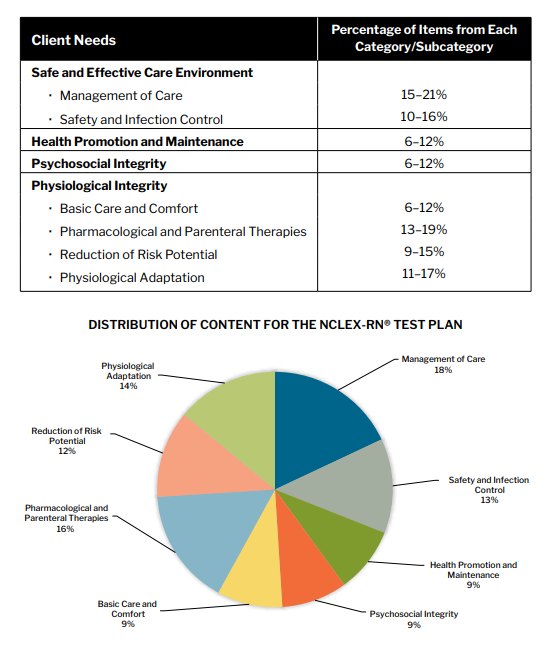Understanding of the NCLEX-RN Syllabus
The NCLEX-RN Test Plan, practice analysis, and knowledge, skills, and abilities (KSA) is based on the data of a survey, both are powered by NCSBN. These studies identify the major functions, knowledge, and skills, entry-level nurses need to ensure safe and effective care. Practice analysis is conducted every three years.
The test plan emphasizes significant thinking and clinical decision-making, which requires nurses to apply knowledge from social, biological, and physical sciences. The main concepts, such as care, clinical decisions, communication, culture, nursing process, and teaching, are integrated in all material categories.
2025 NCLEX‑RN Test Plan: Content Categories & Weightage
The NCLEX framework was designed for the nursing license examination as it offers a consistent structure to outline nursing roles and competencies, with a focus on practice standards in the USA, Canada, and Australia.
The NCLEX-RN Test Plan Syllabus is conducted in the four main categories of patient requirements, two of which are divided into subdomains.
Safe and Effective Care Environment
- Management of Care
- Safety and Infection Control
Health Promotion and Maintenance
Psychosocial Integrity
Physiological Integrity
- Basic Care and Comfort
- Pharmacological and Parenteral Therapies
- Reduction of Risk Potential
- Physiological Adaptation

NCLEX-RN Integrated Processes and Clinical Judgment Steps
| Process / Step | Description |
| Caring | To build a trusting and respectful relationship with the client. They provide a supportive space, compassion, and encouragement to help patients feel better. |
| Clinical Judgment | A multi-step, iterative process where the nurse uses knowledge to observe situations, identify concerns, and deliver evidence-based care. It can appear as standalone questions or as case studies (with six related items). |
| → Recognize cues | Identify relevant data from sources like patient history or vital signs. |
| → Analyze cues | Connect and make sense of the cues in the context of the patient's condition. |
| → Prioritize hypotheses | Evaluate possible issues and decide which ones need attention first. |
| → Generate solutions | Based on the top concerns, think of the best ways to help the client improve. |
| → Take action | Carry out the chosen steps or treatments that address the most urgent concern. |
| → Evaluation outcomes | Check the results, and decide on the next stages. |
| Communication and Documentation | It covers all verbal and non-verbal communications with the patient, family, and care team. It also includes the records, reflecting the provided care and support accountability. |
| Culture and Spirituality | The nurse respects and reacts to each customer's unique cultural and spiritual needs, preferences, and values during care. |
| Nursing Process | A step-by-step approach to provide care: evaluation, analysis, plan, implementation, and evaluation. |
| Teaching/Learning | Help the patient to understand their condition and make informed choices for better health results. |
Safe and Effective Care Environment
Management of Care
Focus: Organizing and overseeing nursing care to protect both clients and staff.
- Integrate advance directives into the client's plan of care
- Delegate and supervise care of client provided by others (e.g., LPN/VN, assistive personnel, other RNs)
- Organize workload to manage time effectively
- Practice and advocate for cost-effective care
- Initiate, evaluate, and update client plan of care
- Provide education to clients and staff about client rights and responsibilities
- Advocate for client rights and needs
- Collaborate with multi-disciplinary team members when providing client care (e.g., physical therapist, nutritionist, social worker)
- Manage conflict among clients and health care staff
- Maintain client confidentiality and privacy
- Provide and receive handoff of care (report) on assigned clients
Safety and Infection Control
Focus: Protecting health care personnel and clients from hazards.
- Assess client for allergies and intervene as needed
- Assess client care environment
- Promote staff safety
- Protect the client from injury
- Properly identify the client when providing care
- Verify appropriateness and accuracy of a treatment order
- Participate in emergency planning and response
- Use ergonomic principles when providing care
- Follow procedures for handling biohazardous and hazardous materials
- Educate the client on safety issues
- Acknowledge and document practice errors and near misses
Health Promotion and Maintenance
Focus: Supporting growth, development, and early detection of issues.
- Provide care and education for the newborn, infant, and toddler client from birth through 2 years
- Provide care and education for the preschool, school-age and adolescent clients ages 3 through 17 years
- Provide care and education for the adult client ages 18 through 64 years
- Provide care and education for the adult client ages 65 years and over
- Provide prenatal care and education
- Provide care and education to an antepartum client or a client in labor
- Provide post-partum care and education
- Assess and educate clients about health risks based on family, population, and community
- Assess client’s readiness to learn, learning preferences, and barriers to learning
Psychosocial Integrity
Focus: Supporting mental, emotional, and social well-being.
- Assess client for abuse or neglect and report, intervene, and/or escalate
- Incorporate behavioral management techniques when caring for a client
- Assess client for substance abuse and/or toxicities and intervene as appropriate (e.g., dependency, withdrawal)
- Assess the client’s ability to cope with life changes and provide support
- Assess the potential for violence and use safety precautions
- Incorporate the client's cultural practices and beliefs when planning and providing care
- Provide end-of-life care and education to clients
Physiological Integrity
Basic Care and Comfort
Focus: Supporting daily living and comfort.
- Assist client to compensate for a physical or sensory impairment (e.g., assistive devices, positioning)
- Assess and manage the client with an alteration in bowel and bladder elimination
- Perform irrigations (e.g., of bladder, ear, eye)
- Perform skin assessment and implement measures to maintain skin integrity
- Apply, maintain, or remove orthopedic devices
- Implement measures to promote circulation (e.g., active or passive range of motion, positioning, and mobilization)
- Assess client for pain and intervene as appropriate
Pharmacological and Parenteral Therapies
Focus: Safe medication and IV therapy.
- Administer blood products and evaluate client response
- Access and/or maintain central venous access devices
- Perform calculations needed for medication administration
- Evaluate client response to medication
- Educate the client about medications
- Prepare and administer medications using the rights of medication administration
- Review pertinent data before medication administration (e.g., contraindications, lab results, allergies, potential interactions)
- Participate in the medication reconciliation process
Reduction of Risk Potential
Focus: Prevent complications from conditions or treatments.
- Assess and respond to changes and trends in client vital signs
- Perform testing within the scope of practice (e.g., electrocardiogram, glucose monitoring)
- Monitor the results of diagnostic testing and intervene as needed
- Obtain blood specimens
- Obtain specimens other than blood for diagnostic testing
Physiological Adaptation
Focus: Managing serious or complex health issues.
- Assist with invasive procedures (e.g., central line, thoracentesis, bronchoscopy)
- Implement and monitor phototherapy
- Maintain the optimal temperature of the client
- Monitor and care for clients on a ventilator
- Monitor and maintain devices and equipment used for drainage (e.g., surgical wound drains, chest tube suction, negative pressure wound therapy)
- Perform and manage the care of a client receiving peritoneal dialysis
Conclusion
The preparation for NCLEX-RN is not only about remembering the facts; it is about understanding what you have learned in real-life clinical situations. With the clinical decision, significant thinking, and a new test plan focusing more on patient safety, your preparation needs to go beyond the textbooks.
That’s where Academically can really help. Our NCLEX preparation course is designed by nursing professionals who understand what the exam actually tests. Focusing on real-world scenarios, latest practice questions, and personal guidance so that you can feel confident on the day of the exam. Whether you are an international nurse or a recent graduate, correct support makes all the difference. With the right strategy and correct equipment, you can clean the NCLEX-RN and take the next step in your nursing career.





